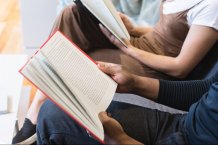
Silver Stories helped children to develop social skills and confidence
A reading project which pairs the old and young helps to boost wellbeing among children and the elderly, analysis shows.
The Silver Stories programme, which involves school age children (called 'readers') reading to older people in the community (called 'listeners') – during the pandemic via the telephone – has built relationships between the generations.
Researchers have found it helped children to develop social skills and confidence and helped schools to build links with their community.
The research, by George Koutsouris, Tricia Nash and Brahm Norwich from the University of Exeter's School of Education, is published in the Cambridge Journal of Education.
The study involved 52 children at five schools in the South West of England and Wales and 47 listeners who took part in the programme for a term during the period of the third coronavirus lockdown. They found participants experienced the programme as an opportunity for relationship-building between generations, highlighting the nature of reading and literacy as one transcending teacher-led sessions and wellbeing as embedded in the way people relate to each other.
Many saw the programme as about helping others while also helping yourself. Readers often felt that the programme aimed to help the older people, who themselves felt they were helping the younger generation.
One listener said: "I thought it was a really good thing for the children, and not realising that it was also intended to help elderly people who don't have many outlets. And I do have outlets, but you know I am pleased to help as long as it's helping the young people."
The programme was also seen as way of building confidence for readers who were expected to read to somebody different from their teachers and parents and as a way of fighting loneliness for listeners. One listener said: "I live on my own, so it's nice to hear a young voice".
A speech and language therapist who was responsible for the running of the programme in her school said: "[The children] liked the idea that they were going to help people that were perhaps feeling quite lonely or were quite isolated; they felt like that they had a real purpose in helping".
Schools involved a mix of children with reading and confidence difficulties. In most cases, the experience of listening to the readings was very positive. However, in other cases, it was more difficult to build a relationship between reader and listener. This is why school staff had an important role in scaffolding the interaction between reader and listener and help them develop a relationship.
Dr Koutsouris said: "During interviews, the programme was reported to bring positive outcomes for readers. Participants reported improvements in interest in reading, confidence and broader social skills such as using the phone and making small talk.
"Other positive outcomes reported in the interviews were reading with expression, learning more words, reading more complex books, reading independently, reading in front of others, and teaching siblings to read."
"Almost all listeners reported a sense of satisfaction. In addition, the sessions seemed to have given structure to some listeners' weekly routine, and for some of them, it was a way of tackling loneliness and isolation."
One speech and language therapist said: "There is a gentleman [who] is genuinely very lonely, very isolated and his highlight of the day or the week was actually [the reader] talking to him. And he found out a girl he talks to, […] he found out that it was her birthday, so he sent in Waterstone vouchers for her to buy some books for her birthday."






